
International Journal of Sustainable Construction Engineering and Technology
Scope & Guideline
Advancing sustainable practices in engineering and technology.
Introduction
Aims and Scopes
- Sustainable Construction Practices:
The journal emphasizes the development and application of sustainable construction practices, focusing on materials, techniques, and processes that minimize environmental impact while maximizing resource efficiency. - Innovative Materials and Technologies:
Research on innovative materials, such as recycled aggregates, geopolymer concrete, and bio-based materials, is a core area, exploring their properties, applications, and effects on sustainability in construction. - Energy Efficiency and Environmental Impact:
The journal covers studies related to energy efficiency in buildings, including design principles, performance evaluation, and renewable energy integration. - Construction Management and Economics:
It includes research on project management, risk assessment, and economic analysis in construction, particularly regarding sustainability and efficiency. - Community Engagement and Social Sustainability:
The journal addresses the social dimensions of construction, including community involvement in projects and the impact of construction practices on social well-being.
Trending and Emerging
- Digital Technologies in Construction:
There is an increasing focus on the integration of digital technologies such as Building Information Modeling (BIM), IoT, and AI in construction, highlighting their role in enhancing efficiency and sustainability. - Circular Economy Practices:
Research on circular economy principles in construction, including waste management and resource recycling, has gained traction, reflecting a broader movement towards sustainability. - Climate Resilience and Adaptation:
Emerging studies are addressing the need for climate-resilient construction practices, focusing on how to adapt designs and materials to withstand environmental changes. - Sustainable Urban Development:
There is a growing emphasis on sustainable urban planning and development, particularly in relation to community engagement, green infrastructure, and smart city initiatives. - Life Cycle Assessment (LCA) in Construction:
Increasing interest in life cycle assessment methods to evaluate the environmental impact of construction projects from a holistic perspective, promoting informed decision-making.
Declining or Waning
- Traditional Construction Methods:
Research on conventional construction methods has decreased, indicating a shift towards more innovative and sustainable approaches to construction. - Focus on Non-Sustainable Materials:
There is a noticeable decline in publications related to non-sustainable materials, as the industry increasingly prioritizes sustainable alternatives. - General Construction Safety Protocols:
Studies focusing on standard safety protocols in construction without a sustainability angle have waned, suggesting a need for more integrated approaches that consider safety alongside sustainability.
Similar Journals

Built Environment Project and Asset Management
Elevating Standards in Built Environment ResearchBuilt Environment Project and Asset Management is an esteemed academic journal published by Emerald Group Publishing Ltd, dedicated to advancing knowledge and research within the fields of architecture, building and construction, civil and structural engineering, and urban studies. With an impressive impact factor reflected in its Q1 and Q2 rankings across various categories, the journal serves as a critical platform for scholars, practitioners, and students seeking to explore the intersections of project management and asset optimization in the built environment. Covering a breadth of topics from sustainable construction practices to innovative management strategies, Built Environment Project and Asset Management promotes high-quality studies and practical applications that contribute significantly to the discipline. With a commitment to the dissemination of impactful research, this journal is a vital resource for those aiming to influence policy and practice in the evolving landscape of the built environment.
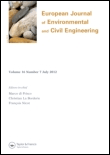
European Journal of Environmental and Civil Engineering
Elevating Standards in Civil and Environmental Engineering ResearchThe European Journal of Environmental and Civil Engineering, published by Taylor & Francis Ltd, is a prestigious peer-reviewed journal that serves as a vital platform for advancing knowledge in the fields of Civil and Structural Engineering as well as Environmental Engineering. With an impressive impact factor and categorized in the Q2 quartile for both engineering fields, this journal occupies a significant position in the scholarly community. Its focused scope encompasses innovative research, case studies, and practical applications that address contemporary environmental and infrastructural challenges. Researchers, professionals, and students alike benefit from the journal's commitment to high-quality discourse, as evidenced by its Scopus rankings, which place it in the top 30% in Civil and Structural Engineering and the top 40% in Environmental Engineering. Through the publication of cutting-edge studies and a commitment to fostering interdisciplinary dialogue, the European Journal of Environmental and Civil Engineering remains an essential resource for those dedicated to improving our built environment and safeguarding our natural resources.
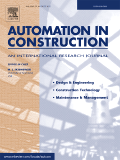
AUTOMATION IN CONSTRUCTION
Driving Efficiency and Innovation in the Construction IndustryAUTOMATION IN CONSTRUCTION is a premier academic journal published by Elsevier, dedicated to advancing the fields of Building and Construction, Civil and Structural Engineering, and Control and Systems Engineering. Since its inception in 1992, this journal has served as a vital platform for disseminating innovative research and practical applications in automation technologies within the construction industry. With a distinguished 2023 impact factor reflected in its Q1 ranking across multiple engineering categories—securing rank #3 in Civil and Structural Engineering and rank #3 in Building and Construction—AUTOMATION IN CONSTRUCTION stands out as a leading resource for researchers, professionals, and students keen on staying at the forefront of this rapidly evolving field. The journal offers access to cutting-edge studies that explore automation processes, methodologies, and tools, contributing to the enhancement of productivity and sustainability in construction practices. With contributions from global experts, each issue of AUTOMATION IN CONSTRUCTION provides comprehensive insights that help drive innovation and foster collaboration.

Gradevinar
Elevating Standards in Civil Engineering Research and PracticeGradevinar, published by the Croatian Society of Civil Engineers-HSGI, is a leading Open Access journal in the field of Civil and Structural Engineering, with a significant history that dates back to its inception in 1980. This journal, with the ISSN 0350-2465 and E-ISSN 1333-9095, has established itself as a vital platform for disseminating innovative research and practical developments in civil engineering, particularly since it became Open Access in 2000, facilitating unrestricted access to its wealth of knowledge. As of 2023, Gradevinar is ranked in the third quartile (Q3) of Scopus’s Civil and Structural Engineering category, demonstrating its growing influence and relevance in the academic community, with a current ranking of #255 out of 379 journals in the field. Researchers, professionals, and students benefit from this journal's commitment to high-quality content that reflects the latest advancements and best practices in civil engineering, contributing to both technical proficiency and sustainable development in infrastructure projects across Croatia and beyond.

Journal of Green Building
Advancing Sustainable Architecture for a Greener TomorrowJournal of Green Building, with its ISSNs 1552-6100 and 1943-4618, is a premier academic journal published by COLLEGE PUBLISHING in the United States. This journal, established in 2006 and continuing through 2024, serves as a vital platform for the dissemination of research on sustainable architecture, building technologies, and environmental design. With its current impact factor signifying a robust academic contribution, it is categorized in Q2 in Architecture and Q3 across several other disciplines, including Building and Construction, Environmental Engineering, and Public Health. The journal’s Scopus rankings demonstrate its strong positioning in the engineering and environmental science communities, making it an essential resource for researchers and professionals aiming to advance knowledge in green building practices. While it is not an Open Access journal, the rich content is pivotal for those involved in the critical intersection of sustainability and construction science. Whether you are a seasoned professional or a dedicated student, the Journal of Green Building offers invaluable insights that drive future innovations in eco-friendly building environments.
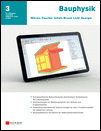
Bauphysik
Exploring Sustainable Solutions for the Built EnvironmentBauphysik, published by ERNST & SOHN, is a prestigious journal dedicated to the fields of architecture, building construction, and environmental engineering. With a strong focus on the principles of building physics, Bauphysik serves as a key platform for researchers, professionals, and students alike, disseminating vital information and advancements within the industry. The journal, boasting an ISSN of 0171-5445 and an E-ISSN of 1437-0980, is well-regarded with a categorization in the Q2 quartile in Architecture and Q4 quartiles in Building and Construction and Environmental Engineering as of 2023. Its Scopus ranks further highlight its impact within the community, with rankings of 83/189 in Architecture, 179/223 in Building and Construction, and 167/197 in Environmental Engineering. Despite its lack of open access options, the journal's retrospective convergence from 1982 to 2024 marks its long-standing influence in advancing building physics research. With a dedicated readership, Bauphysik encourages the exploration and sharing of innovative solutions to contemporary challenges in the built environment.
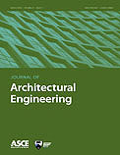
Journal of Architectural Engineering
Exploring Sustainable Solutions for Tomorrow's StructuresThe Journal of Architectural Engineering, published by the ASCE (American Society of Civil Engineers), stands as a pivotal resource in the interdisciplinary fields of architecture and engineering. With an ISSN of 1076-0431 and E-ISSN 1943-5568, this journal has garnered a notable reputation since its inception in 1995, currently converging towards 2024. Boasting a Q1 ranking in Architecture and Visual Arts and Performing Arts, alongside respectable Q3 rankings in Building and Construction and Civil and Structural Engineering, the journal places itself in the elite class of scholarly publications, evidenced by its impressive Scopus rankings. Its commitment to providing cutting-edge research ensures comprehensive coverage across various aspects of architectural engineering, facilitating robust interdisciplinary dialogues. Although the journal operates under a traditional access model, its impact on the academic community remains profound, making it an essential platform for researchers, professionals, and students who seek to push the boundaries of knowledge in their respective fields. This journal not only aims to stimulate innovative ideas but also fosters a collaborative environment for advancing sustainable architectural practices in a rapidly evolving built environment.
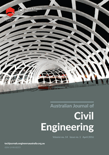
Australian Journal of Civil Engineering
Transforming Ideas into Engineering ExcellenceThe Australian Journal of Civil Engineering, published by Taylor & Francis Ltd, stands as a pivotal platform within the field of civil and structural engineering. With an ISSN of 1448-8353 and an E-ISSN of 2204-2245, this journal consistently delivers high-quality research and innovative practices from both established and emerging scholars in the discipline. Recognized in the Q2 category for Civil and Structural Engineering in 2023, it holds a respectable position, ranking 146 out of 379 within its field according to Scopus, which places it in the 61st percentile. Converging valuable insights from 2011 through 2024, the journal encompasses a broad scope of topics, including sustainable infrastructure, innovative materials, and advanced construction techniques, thereby addressing contemporary challenges faced by engineering professionals. Though it is a traditional publication without open access options, the quality of the research featured ensures that it remains an essential resource for academics, practitioners, and students striving to enhance their knowledge and contribute to the dynamic field of civil engineering.
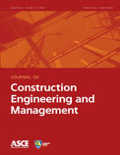
JOURNAL OF CONSTRUCTION ENGINEERING AND MANAGEMENT
Advancing the Future of Construction EngineeringJournal of Construction Engineering and Management, published by the American Society of Civil Engineers (ASCE), is a premier scholarly journal dedicated to advancing the field of construction engineering and management. With an ISSN of 0733-9364 and an E-ISSN of 1943-7862, this respected journal boasts a noteworthy impact factor and is categorized in the Q1 quartile across significant fields such as Building and Construction, Civil and Structural Engineering, and Strategy and Management. Covering a broad spectrum of topics relevant to professionals, researchers, and students from its inception in 1982 through 2024, the journal emphasizes innovative research and practical applications that are vital to the construction industry. While it is not an open-access journal, it provides essential insights into the evolving dynamics of construction management, regulatory changes, and technological advancements, making it an indispensable resource for anyone looking to stay at the forefront of their field.

Revista Ingenieria de Construccion
Shaping Tomorrow's Infrastructure Through Rigorous ResearchRevista Ingenieria de Construccion is a prominent open-access journal dedicated to advancing knowledge and practice in the fields of building and construction engineering, as well as civil and structural engineering. Published by the Pontificia Universidad Católica de Chile, specifically the Department of Engineering and Construction Management, this journal has been providing free access to quality research outputs since 1986, ensuring that vital information is available to both practitioners and academics globally. With its current placement in the Q4 category of both the Building and Construction and Civil and Structural Engineering quartiles, it serves as a platform for innovative studies and critical discussions, positioning itself strategically within the academic landscape. The journal is indexed in Scopus, ranking #157 in Building and Construction and #291 in Civil and Structural Engineering, reflecting the growing impact and relevance of its contributions. Researchers, professionals, and students are encouraged to engage with the rigorous and diverse content published within its pages, fostering a vibrant academic and practical discourse.